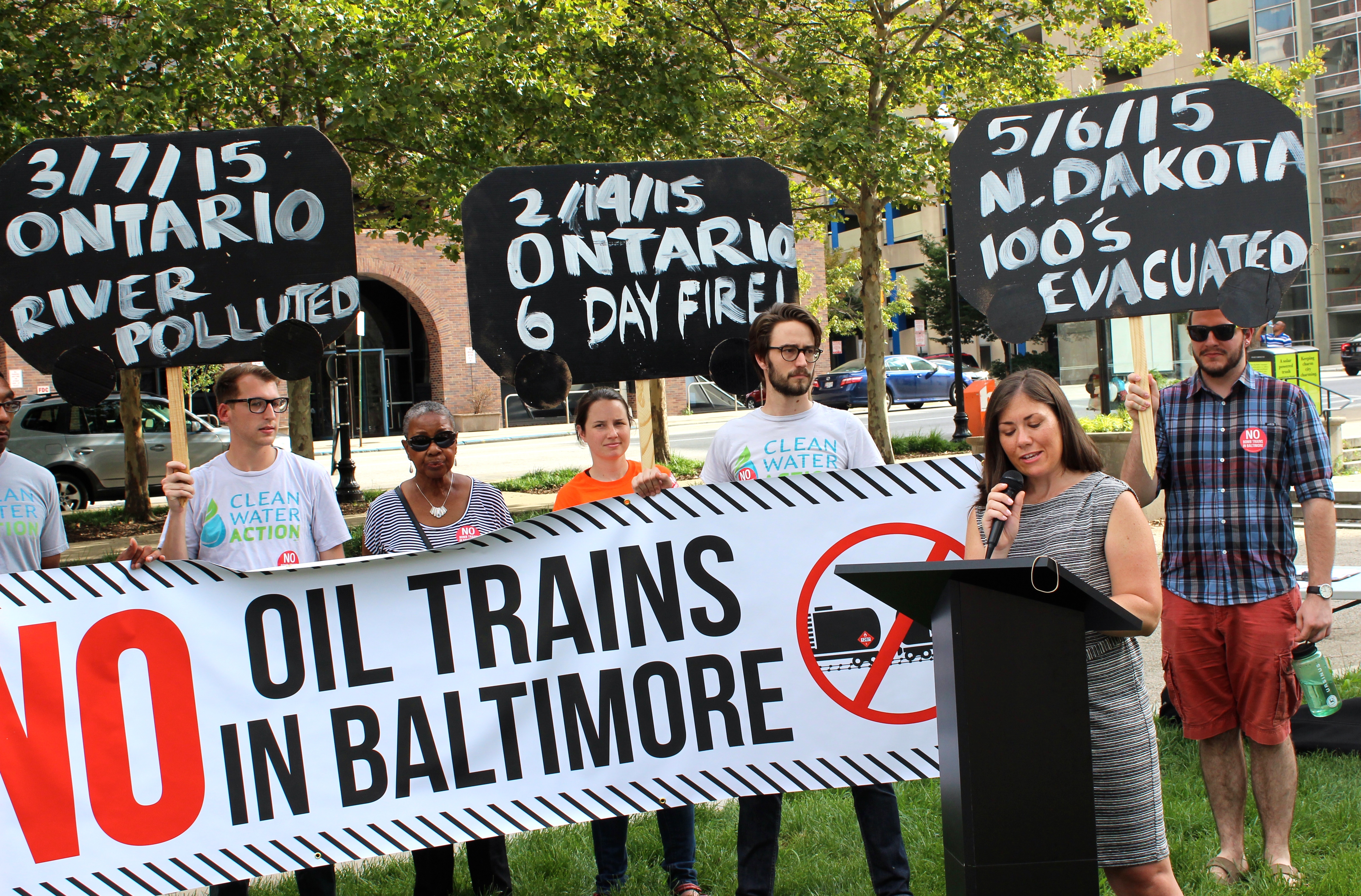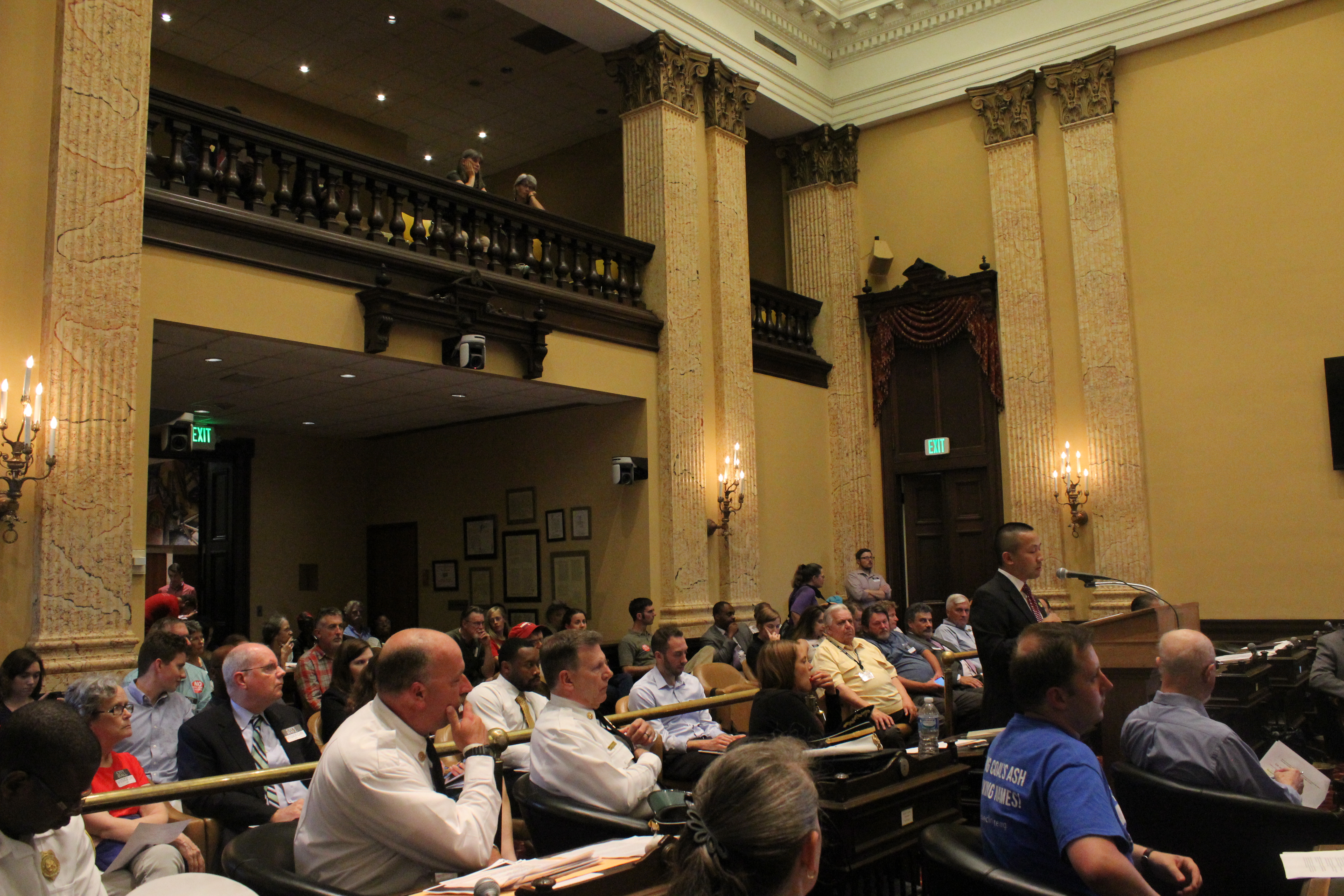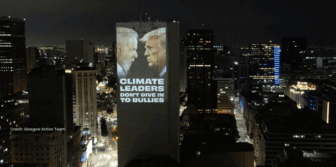On Wednesday, over 70 concerned Maryland residents rallied in front of Baltimore City Hall before the City Council’s first public hearing about the dangers of crude oil trains travelling through the city.
Our rally joined the North American “Stop Oil Trains” week of action, uniting communities across the U.S. and Canada fighting to protect people’s safety and our climate from extreme oil.
As the rally kicked off at 5:30 p.m. in 90-degree heat, a sea of red shirts and stickers converged on the green lawn across from City Hall. Rally-goers assembled a replica “oil train” marked with the dates and sites of accidents that have occurred across North America in 2015 alone — in West Virginia, North Dakota, Illinois, and Ontario. A last-minute sign repair pulled my attention away from the beginning rally. By the time I looked up, the amount of red had doubled.
The rally-goers listened intently as each speaker expressed his or her concerns about oil trains rolling through Baltimore. This week marked the two-year anniversary of the worst oil train disaster in North America, in Lac-Mégantic, Quebec, which killed 47 people.
“It’s clear that a crude oil train derailment in densely populated areas like Baltimore City could lead to a disastrous loss of life and property,” said Delegate Clarence Lam, MD, MPH (District 12—Howard and Baltimore Counties), who spoke at the rally and testified before the City Council.
“Oil trains don’t have to explode to be dangerous,” said Trisha Sheehan, Regional Field Director at Moms Clean Air Force. “They leak toxic chemicals, endangering everyone’s lungs, especially those most vulnerable to air pollution—our children.”

Mike Tidwell, director of CCAN, wrapped up the rally with a fiery speech. “Baltimore is in the blast zone,” he exclaimed. “City Hall is in the potential blast zone!”
The “blast zone” is the one-mile radius around railroad tracks that could be impacted by an oil train derailment and fire. In all, ForestEthics calculates that this zone includes 165,000 Baltimore residents.
The rally closed with Mike starting some chants and leading the crowd into City Hall. As I waited in a line to get into City Hall, I asked a fellow rally-goer what brought him out: “Once you know about an issue as threatening as crude oil by rail it’s hard to not stand up and do something,” said Cullen Simon.
This was the first hearing on oil trains City Councilmembers had held, and our crowd filled the seats with red “No Bomb Trains in Baltimore” stickers.
Speakers called on city and state leaders to act now to protect local rail communities. Specifically, the City Council should place a moratorium on approving permits for crude oil shipping terminals until local emergency management, health and safety officials study the associated dangers.
Presenters included Delegate Lam, Dr. Ana Rule, an air pollution researcher from Johns Hopkins University, Fred Millar, a rail safety expert, and Jon Kenney, Maryland Community Organizer at CCAN.

The presenters urged the City Council to place a moratorium on permits for crude oil shipping terminals as a step to prevent vulnerable city neighborhoods from becoming a gateway for even more of this dangerous cargo.
While federal regulations govern the movement of oil on railways, city officials have the power to regulate terminals where the oil is unloaded to be shipped on barges to East Coast refineries. The Baltimore Sun has reported that over 100 million gallons of highly volatile, toxic and climate-polluting oil has been shipped out of Baltimore over the previous two years — up from zero gallons the two years before.
The rally and hearing coincided with over 80 events planned across North America during the week of July 6th to draw attention to the growing threat oil trains pose to our health, safety, and climate. Organizers of the week of action are demanding a federal ban on dangerous oil trains.
Thanks to everyone who turned out in Baltimore, we made a big impact in getting this issue on the radar of city officials and important media outlets. The Baltimore Sun, WYPR radio, and the Baltimore Brew all ran stories on the protest and hearing, which will help educate more residents about this growing problem.
As the national week of action closes on Sunday July 12th, CCAN and supporters will continue to press forward to pass a moratorium on crude oil shipping terminal permits in Baltimore.






